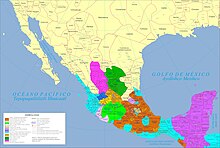This article needs additional citations for verification. (August 2011) |
| History of Mexico |
|---|
 |
| Timeline |
|
|

The pre-Columbian (or prehispanic) history of the territory now making up the country of Mexico is known through the work of archaeologists and epigraphers, and through the accounts of Spanish conquistadores, settlers and clergymen as well as the indigenous chroniclers of the immediate post-conquest period.
Human presence in the Mexican region was once thought to date back 40,000 years based upon what were believed to be ancient human footprints discovered in the Valley of Mexico, but after further investigation using radioactive dating, it appears this is untrue.[1] It is currently unclear whether 21,000-year-old campfire remains found in the Valley of Mexico are the earliest human remains in Mexico.[2] Indigenous peoples of Mexico began to selectively breed maize plants around 8000 BC. Evidence shows a marked increase in pottery working by 2300 BC and the beginning of intensive corn farming between 1800 and 1500 BC.
Between 1800 and 300 BC, complex cultures began to form. Many matured into advanced Mesoamerican civilizations such as the: Olmec, Izapa, Teotihuacan, Maya, Zapotec, Mixtec, Huastec, Purépecha, Totonac, Toltec, and Aztec, which flourished for nearly 4,000 years before the first contact with Europeans.
- ^ Paul R. Renne; et al. (2005). "Geochronology: Age of Mexican ash with alleged 'footprints'". Nature. 438 (7068): E7–E8. doi:10.1038/nature04425. PMID 16319838.
- ^ "Native Americans", Encarta Archived 2009-06-14 at the Wayback Machine